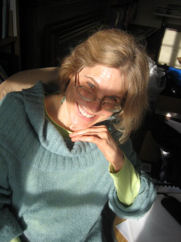It’s nearly half past ten, and my Baby, who honoured me with a visit after I called her up and got really grumpy because she hasn’t been here for weeks, has just gone to bed. We have negotiated a 7.40 departure in the morning, so I can brave Oxford traffic and she can get to school on time (8:45). She tells me that she doesn’t come to my house more often for this very reason: I insist on living in the middle of nowhere (a little village fifteen miles outside the city).
In the morning, besides providing transport it seems I am to supply disposable contact lenses, and before bed we had a little negotiation about what diopters I could deliver. I’m just saying.
And now I have a moment (but only just) to consider today’s important news: researchers at Reading University in the UK have created a computer program to identify the our oldest (most persistent) words and to predict those most likely to disappear.
Some of what they have discovered doesn’t surprise me; the oldest words are rather dull: I, we, two, three. Well, it was always all about us and how much we have got. It seems these words are pretty much the same in every Indo European language as long as you know a few simple sound change rules in order to spot them.
A long time ago, though it wasn’t quite prehistory, I knew stuff about the history of the language. For instance, I knew about words, admittedly younger than those above, but still remarkably stable: mother, father, water. I read once, though I now apologise for forgetting the source, that honey and bee are also words whose forms we can postulate, long before they might have been written.
In the days when I knew about this sort of stuff, I could read, more or less, Old English (Anglo Saxon). My first homework on the subject, after just one day of class, was to translate The Battle of Maldon, a poem about a glorious English defeat (the first of many — Brits are good at losing) in 991.
This is how the poem begins, and if you can read it, and you don’t have a PhD or hang around the language project at Reading, I will give you a six pence:
brocen wurde
Het þa hyssa hwæne hors forlætan
feor afysan and forð gangan
hicgan to handum and to hige godum
Þa þæt Offan mæg ærest onfunde
þæt se eorl nolde yrhðo geþolian
he let him þa of handon leofne fleogan
hafoc wið þæs holtes and to þære hilde stop
be þam man mihte oncnawan þæt se cniht nolde
wacian æt þam wige þa he to wæpnum feng
I couldn’t read it either, of course. But as I was struggling through the poem I eventually came to the line “ofer cald wæter”. That had lasted, and was perfectly coherent, a thousand years later.
For at least a millenium speakers of English have been telling their friends that battle or no battle, if you are going to cross the North Sea the wæter is cald!
Other words, apparently, we are not using enough and they are changing fast. First to go, according to the computer projection, will be squeeze, dirty, stick and guts.
I quite like all those words! Use them or lose them, folks.











